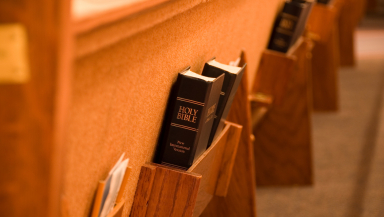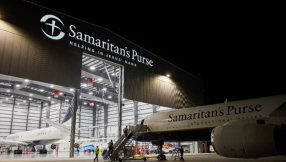
Evangelical churches up and down the country are reporting an increase in the number of people exploring faith and finding Jesus.
Latest research by the UK Evangelical Alliance (EA UK) has found that twice as many people are committing to Jesus now than in 2021 during the pandemic.
The Changing Church 2025 study surveyed 305 church leaders and nearly a thousand individuals to find out how the evangelical Church in the UK has changed since the pandemic.
Although smaller churches are struggling, there are also some encouraging findings, with churches reporting increased attendance and an openness to faith.
Churches reported an average increase in attendance of 13% since January 2020, just before the UK went into its first lockdown.
They also reported twice as many people making first-time commitments to follow Jesus as when surveyed in 2021 - an average of 3.5 people per church in the last three months.
The EA UK's research lead, Danny Webster, said the findings were an indication that "church life has bounced back" since the challenging years of the pandemic.
Gavin Calver, CEO of Evangelical Alliance, is optimistic: “The last five years have changed the evangelical church in the UK.
"What I’m seeing as I travel around the country is churches that are growing as they confidently share the hope of Jesus, and a general openness to faith, which is reflected in our new Changing Church report.”
Despite the good news, challenges remain, with the study also finding a sharp drop in weekly attendance. In 2020, just over 90% of individuals said they were attending church weekly. Today this has fallen to 78%.
The study also reveals that church growth is a mixed picture - most of it has been occurring in larger churches, while smaller churches have been shrinking.
When it comes to volunteering, larger churches were more likely to have seen an increase compared to medium-sized churches which experienced a decrease. Volunteering numbers have remained stable in smaller churches. The biggest volunteering shortfall is in children's and youth ministry.
One in five churches said a volunteering shortage was affecting their ability to run some ministries, while around half said they were managing to get by with the numbers they had.
Larger churches were also more likely to see an increase in giving, but the study found that even where this has been the case, it has not been enough to keep pace with inflation.
Mr Webster said: “The research demonstrates that churches have changed since they were forced to close in the pandemic. For larger churches, they are growing and smaller churches are struggling, but churches of all sizes are seeing people join them.
“While we found that habits of engaging with churches and church activities had changed, for example, people attend slightly less frequently, in most areas, church life has bounced back since the Covid shutdown.
“One key trend identified in the research is the different experience for large and small churches; this has an inevitable knock-on effect, so smaller churches are more likely to report struggles with income and volunteering.”
The report can be read in full here













